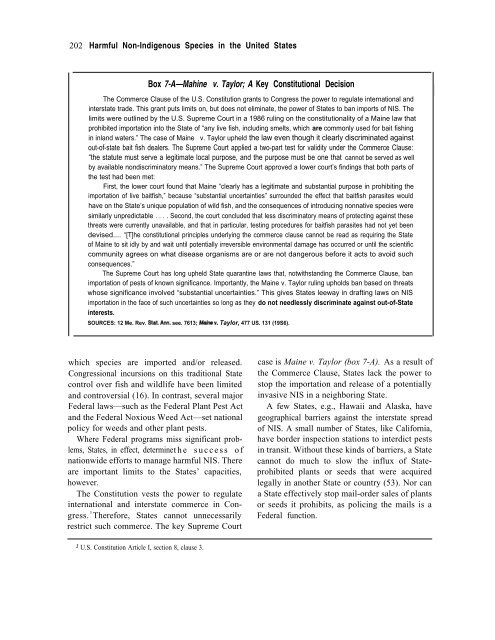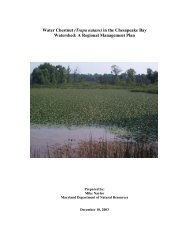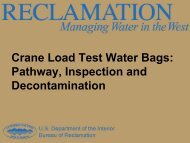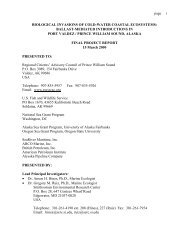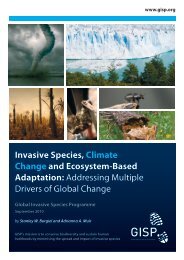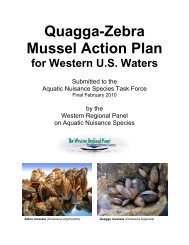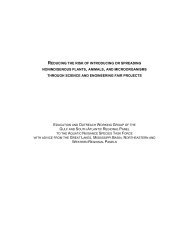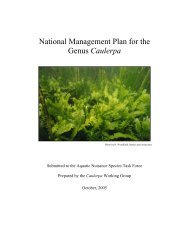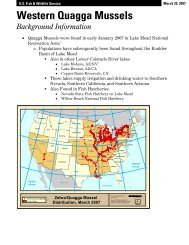Harmful Non-Indigenous Species in the United States - Aquatic ...
Harmful Non-Indigenous Species in the United States - Aquatic ...
Harmful Non-Indigenous Species in the United States - Aquatic ...
Create successful ePaper yourself
Turn your PDF publications into a flip-book with our unique Google optimized e-Paper software.
202 <strong>Harmful</strong> <strong>Non</strong>-<strong>Indigenous</strong> <strong>Species</strong> <strong>in</strong> <strong>the</strong> <strong>United</strong> <strong>States</strong>Box 7-A—Mah<strong>in</strong>e v. Taylor; A Key Constitutional DecisionThe Commerce Clause of <strong>the</strong> U.S. Constitution grants to Congress <strong>the</strong> power to regulate <strong>in</strong>ternational and<strong>in</strong>terstate trade. This grant puts limits on, but does not elim<strong>in</strong>ate, <strong>the</strong> power of <strong>States</strong> to ban imports of NIS. Thelimits were outl<strong>in</strong>ed by <strong>the</strong> U.S. Supreme Court <strong>in</strong> a 1986 rul<strong>in</strong>g on <strong>the</strong> constitutionality of a Ma<strong>in</strong>e law thatprohibited importation <strong>in</strong>to <strong>the</strong> State of “any live fish, <strong>in</strong>clud<strong>in</strong>g smelts, which are commonly used for bait fish<strong>in</strong>g<strong>in</strong> <strong>in</strong>land waters.” The case of Ma<strong>in</strong>e v. Taylor upheld <strong>the</strong> law even though it clearly discrim<strong>in</strong>ated aga<strong>in</strong>stout-of-state bait fish dealers. The Supreme Court applied a two-part test for validity under <strong>the</strong> Commerce Clause:“<strong>the</strong> statute must serve a legitimate local purpose, and <strong>the</strong> purpose must be one that cannot be served as wellby available nondiscrim<strong>in</strong>atory means.” The Supreme Court approved a Iower court’s f<strong>in</strong>d<strong>in</strong>gs that both parts of<strong>the</strong> test had been met:First, <strong>the</strong> lower court found that Ma<strong>in</strong>e “clearly has a legitimate and substantial purpose <strong>in</strong> prohibit<strong>in</strong>g <strong>the</strong>importation of live baitfish,” because “substantial uncerta<strong>in</strong>ties” surrounded <strong>the</strong> effect that baitfish parasites wouldhave on <strong>the</strong> State’s unique population of wild fish, and <strong>the</strong> consequences of <strong>in</strong>troduc<strong>in</strong>g nonnative species weresimilarly unpredictable . . . . Second, <strong>the</strong> court concluded that less discrim<strong>in</strong>atory means of protect<strong>in</strong>g aga<strong>in</strong>st <strong>the</strong>sethreats were currently unavailable, and that <strong>in</strong> particular, test<strong>in</strong>g procedures for baitfish parasites had not yet beendevised.... “[T]he constitutional pr<strong>in</strong>ciples underly<strong>in</strong>g <strong>the</strong> commerce clause cannot be read as requir<strong>in</strong>g <strong>the</strong> Stateof Ma<strong>in</strong>e to sit idly by and wait until potentially irreversible environmental damage has occurred or until <strong>the</strong> scientificcommunity agrees on what disease organisms are or are not dangerous before it acts to avoid suchconsequences.”The Supreme Court has long upheld State quarant<strong>in</strong>e Iaws that, notwithstand<strong>in</strong>g <strong>the</strong> Commerce Clause, banimportation of pests of known significance. Importantly, <strong>the</strong> Ma<strong>in</strong>e v. Taylor rul<strong>in</strong>g upholds ban based on threatswhose significance <strong>in</strong>volved “substantial uncerta<strong>in</strong>ties.” This gives <strong>States</strong> leeway <strong>in</strong> draft<strong>in</strong>g laws on NISimportation <strong>in</strong> <strong>the</strong> face of such uncerta<strong>in</strong>ties so long as <strong>the</strong>y do not needlessly discrim<strong>in</strong>ate aga<strong>in</strong>st out-of-State<strong>in</strong>terests.SOURCES: 12 Me. Rev. StatAnn. see. 7613; Ma<strong>in</strong>ev. Taylor, 477 US. 131 (19S6).which species are imported and/or released.Congressional <strong>in</strong>cursions on this traditional Statecontrol over fish and wildlife have been limitedand controversial (16). In contrast, several majorFederal laws—such as <strong>the</strong> Federal Plant Pest Actand <strong>the</strong> Federal Noxious Weed Act—set nationalpolicy for weeds and o<strong>the</strong>r plant pests.Where Federal programs miss significant problems,<strong>States</strong>, <strong>in</strong> effect, determ<strong>in</strong>e<strong>the</strong> success ofnationwide efforts to manage harmful NIS. Thereare important limits to <strong>the</strong> <strong>States</strong>’ capacities,however.The Constitution vests <strong>the</strong> power to regulate<strong>in</strong>ternational and <strong>in</strong>terstate commerce <strong>in</strong> Congress.3 Therefore, <strong>States</strong> cannot unnecessarilyrestrict such commerce. The key Supreme Courtcase is Ma<strong>in</strong>e v. Taylor (box 7-A). As a result of<strong>the</strong> Commerce Clause, <strong>States</strong> lack <strong>the</strong> power tostop <strong>the</strong> importation and release of a potentially<strong>in</strong>vasive NIS <strong>in</strong> a neighbor<strong>in</strong>g State.A few <strong>States</strong>, e.g., Hawaii and Alaska, havegeographical barriers aga<strong>in</strong>st <strong>the</strong> <strong>in</strong>terstate spreadof NIS. A small number of <strong>States</strong>, like California,have border <strong>in</strong>spection stations to <strong>in</strong>terdict pests<strong>in</strong> transit. Without <strong>the</strong>se k<strong>in</strong>ds of barriers, a Statecannot do much to slow <strong>the</strong> <strong>in</strong>flux of Stateprohibitedplants or seeds that were acquiredlegally <strong>in</strong> ano<strong>the</strong>r State or country (53). Nor cana State effectively stop mail-order sales of plantsor seeds it prohibits, as polic<strong>in</strong>g <strong>the</strong> mails is aFederal function.s U.S. Constitution Article I, section 8, clause 3.


